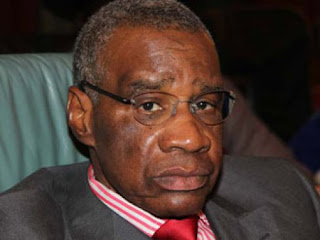 |
| Chief Justice of Nigeria, Dahiru Musdapher |
Many people hailed the recent ruling of the Supreme Court which sacked five governors who had overstayed their fixed tenure in office. The court held in its ruling that the tenures of Governors Timipre Sylva of Beyalsa, Murtala Nyako of Adamawa, Aliyu Magatakarda Wamakko of Sokoto, Ibrahim Idris of Kogi and Liyel Imoke of Cross River states expired since last year.
This development has once again showcased the existing principle of checks and balances which every ideal democratic state should practice. Nevertheless, the decision of the country's apex court is laudable and impressive; but the timing, to me, is unnecessarily delayed, and should have come earlier. A Federal High Court had held earlier that their tenures began to run from the day of their last oaths of office and allegiance, which they took after their re-election, following the nullification of the first poll that brought them to office. It is not enough that the Supreme Court faulted the decisions of the Federal High Court and the Appeal Court in this case. It should not end there. There ought to be a synergy between the lower and upper Bench, possibly by way of some explicit guidelines to help lower courts not to misdirect themselves.
There is the need to prevent future reoccurrence of such faulty judgments that enable the beneficiaries to usurp mandates or offices they do not deserve. The sacked governors enjoyed extra one year, collecting salaries and allowances and more or less governing their states illegally. In the online comments on the subject recently, a contributor said the governors should be asked to refund all the salaries and allowances they enjoyed during their illegal occupation of their offices, while another said the Supreme Court should have ruled that there should be deductions from their future pay, for those of them that may be re-elected. But I think that more blame should be apportioned to the lower and upper Bench, and not politicians who are ready to exploit even worse situations to hang on endlessly to power. According to the ruling of the apex court, the trial court and the Court of Appeal erred in law when they considered the actions of the governors before their elections were nullified by the Election Petition Tribunals as valid, and discounting the time they spend doing those valid actions from their constitutionally prescribed tenure of office.
The delayed case and judgments of the courts unnecessarily made these former governors to occupy and deny other able politicians the chance to vie for the highest positions in the different states. Secondly, for not acting promptly and making its decision on the matter known before now, the Supreme Courts intervention is neither impressive. Nigerias judicial system should reform the bottlenecks that make cases linger for years before they are decided. While it is good to have a thoroughly arbitrated case by crosschecking facts and ensuring that all loopholes are plugged, justices and judges should endeavour to put time factor into consideration. As the legal maxim says "justice delayed is justice denied", I think this should always be handy to stop this practice of delaying and adjourning cases unnecessarily for years before a final judgment day. Assuming the Supreme Court had ruled earlier than it did, Nigeria would be spared the drama that occurred in Kogi State, where two different governors were sworn in the same day. We cant afford as a country to always create bad records and continue to make a mockery of Nigeria before the international community. Take the Major Hamza al Mustapha case for example. The matter is yet to be concluded.
Though he was sentenced to death by hanging, the convict has already gone on appeal. Who knows? This case that took 13 years before it was decided may still linger for another 13 years! Maybe this is another Troy Davis case, where in the United States, the black man was in extreme psychological trauma for 20 years before he was executed last year, after several neglected international appeals from renowned personalities.
The former Illinois governor, Rod Blagojevich, was sentenced to 14 years imprisonment last year, after a three-year battle against criminal charges. His case was a high profile one in the US, as the ex-governor attempted to sell President Barrack Obamas old senate seat. However, he received the commendations of the judge who read his sentence for taking responsibility for his actions. Blagojevich in his last plea, after many years of pleading his innocence, admitted that he made terrible mistakes. "Im here convicted of crimes ... and I am accepting of it, I acknowledge it and I, of course, am unbelievably sorry for it."
If it were to be in Nigeria, perhaps such a high profile case could run for years with continuous adjournments. Our courts should sometimes give room for the quick dispensation of justice, especially where an offender accepts his or her wrong doing, instead of encouraging cases to drag on. Our judiciary system should embrace a new regime of quick trial of cases and giving speedy judgments to prevent the waste of scarce resources; and to avoiding further confusion in the land.
No comments:
Post a Comment